Anthony LaPaglia reveals a softer side under the tough-guy image
A gentle soul, well read, deeply political… there’s more to Anthony LaPaglia than meets the eye.
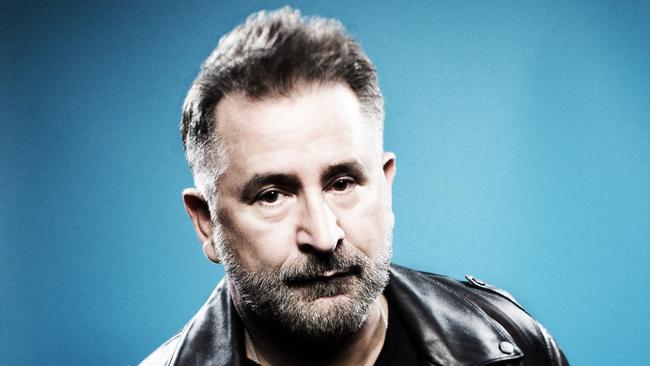
On the left, stretched elbow to wrist, is a zipper-edged line, slightly softened by time: his birthdate in Roman numerals. The right arm is tattooed too: a sleeve of tribal geometrics suspended above a mystic figure, wreathed in flowing robes. And there, on Anthony LaPaglia’s inner forearm, on the tender and vulnerable part of a body once said to exude “the testosterone-fuelled hostility of a charging bull”, is a hyper-realistic portrait of his daughter Bridget, inked when she was six years old.
It’s lovely and sort of preposterous but it shouldn’t be surprising. Beneath the muscular bulk and gravelly, nicotine-stained voice that has given life to four decades’ worth of onscreen mobsters and tough-guy cops, the LA-based actor is just a big old softie. “He’s an absolute sweetheart,” says Robert Connolly, who’s directed three of LaPaglia’s Australian films. “He can look as tough as nails if he needs to and he has a physicality that cinema loves, but he’s actually a very gentle soul.”
Except when it comes to the cataclysm of current events. Except if you’re a dishonest politician. Or a prejudiced policeman or a coronavirus sceptic. If you are in any way bigoted or blinkered. Widely read, intensely political and possessed of a rare perspective after splitting his 61 years evenly between Australia and the United States, it doesn’t take much to set him off.
Poke LaPaglia, not too hard, with a question like, “How’s it going?”, and you could spark a 17-minute discourse that reaches across a gamut of sociopolitical afflictions and villains but ultimately boils down to this: America is broken. “If you scratch the surface just a little bit there’s a lot of trouble underneath,” he says. “It’s been brewing for a long time. I keep telling my daughter, ‘Pay attention. You are living through one of the most remarkable times in history’.”
Remarkable and deeply weird. LaPaglia hasn’t seen his PR consultant wife, Alexandra Henkel, 30, for five weeks; they were reduced to celebrating their second anniversary over Instagram. She’s in Melbourne, working. He’s home in LA’s affluent Brentwood in lockdown with Bridget, his 17-year-old daughter with former wife, actress Gia Carides. He leaves the house rarely; he’s been to a couple of Black Lives Matter protests – “I wasn’t up there chanting, just went to support” – but otherwise he’s trapped in the pandemic’s messed-up matrix with the rest of us. Time stretched out on a rack.
LaPaglia, a former National Soccer League goalkeeper and former part-owner of Sydney FC, has just watched an English Premier League game on TV. “They all ‘took the knee’ wearing shirts with BLM where their names would be,” he says. “It shows you this is not just an American problem; Australia has it, every country in the world has it. Racism is a global problem.”
LaPaglia has a lot to say, about racism and detention and slavery and inequality and people power. But he also says this: You don’t have to listen to him. “I don’t think an actor is the first person you should go to for a political opinion,” he says. “I know a couple of really smart actors but not that many.” When he does voice an opinion, he likes to ensure it comes from “a somewhat educated place”, he says. “This is just what I think. It doesn’t mean it’s true, it doesn’t mean it’s right. It’s just where my moral compass is.” You can take it or leave it. Or you can just watch the movies.
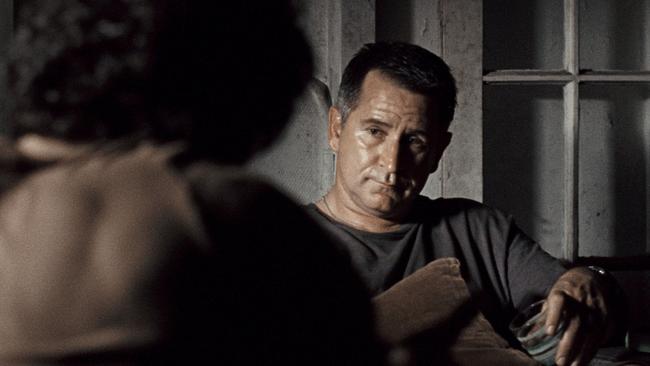
An indelible mark. A minor mutiny. LaPaglia’s tattoo journey began on his left bicep in 1982, the year he upped stakes and moved to New York. He was 23 years old. Genteel 1980s Adelaide was stultifying, a town where the son of working-class immigrant parents (his dad’s Italian, his mother Dutch) was not expected to excel. He’d worked a few jobs, including a stint as a primary school teacher, but had become smitten with the idea of acting after taking a date to a play in Sydney. Moving into a windowless basement in Greenwich Village, he relinquished his Australian accent by obsessively rewatching Al Pacino in Dog Day Afternoon and began appearing steadily in American films as “the gun-toting guy whose name ends in a vowel”. “I didn’t know anything,” he says now. “I was just young and dumb and up for the adventure. If I knew then what I know now I probably wouldn’t have done it.”
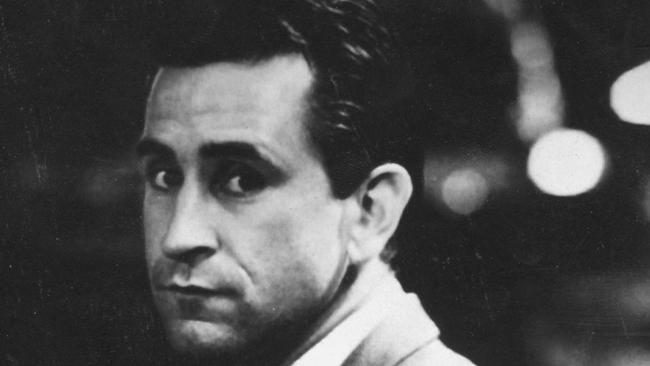
His breakout role came in the 1990 comedy Betsy’s Wedding, playing a polite gangster besotted with Ally Sheedy’s character: Maybe you like classical music, like Sinatra? Reviewers at the time focused on his sharp suits, intense gaze and slick, patent-leather hair and pronounced him “100 per cent pure, freeze-dried De Niro”.
LaPaglia shrugged off the comparisons, countered that he was going for more of a “Damon Runyon type character” and proceeded to play a mafia thug opposite Susan Sarandon in The Client, an Italian-American detective in Spike Lee’s Summer of Sam and a hit man in Woody Allen’s Sweet and Lowdown. He also won a 1998 Tony Award for his part in a Broadway revival of Arthur Miller’s A View From the Bridge.
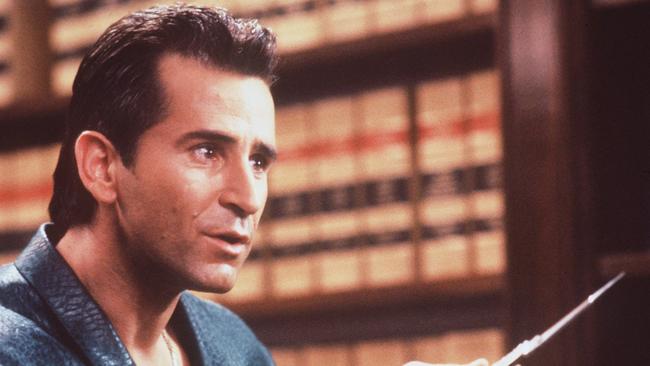
A detour home, to play yet another detective in Ray Lawrence’s Lantana, scored him a Best Actor AFI Award before he landed the lead role on CBS’s Without a Trace as New York City’s gruff guardian angel, FBI senior agent Jack Malone. The hit international franchise ran from 2002 for seven seasons, earned him a Golden Globe and lifted his profile sky-high. It also – he’s not too proud to say it – lined his pockets with plenty of rainy-day American currency.
Writing in Entertainment Weekly, TV critic Ken Tucker marvelled at “the unlikely throb of energy” LaPaglia brought to “an uneven series”. “Watching him inject so much shrewd intelligence into Malone’s quiet, clipped questioning of a suspect, you wonder if the actor’s grooving on the notion that he’s making big US bucks in a role that requires a fifth of his talent,” he wrote.
Grooving on that notion he was. Working steadily, often to critical acclaim, he has played the long game, quietly building the kind of dream career that buys a mansion in Brentwood while allowing for experimental forays into more personal work. “It’s exactly what I wanted it to be,” he says. “What I’ve learnt is, acting is a game of tenacity in a lot of ways. There are jobs I do for money – I’ve got obligations – and sometimes it’s for art. I try to keep the equation ‘two for them, one for me’.”
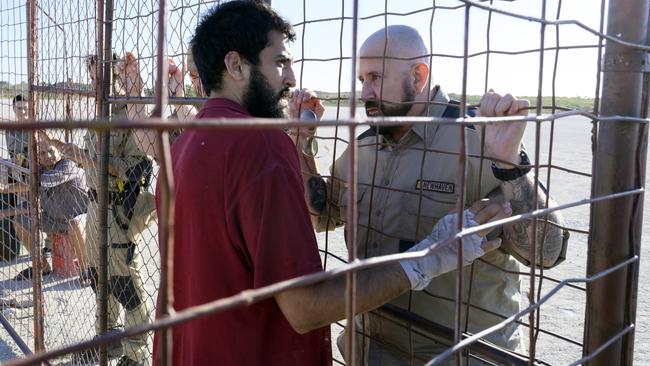
The ones he does for himself are increasingly Australian-made as the passage of time redoubles his affection for the country he left behind. Often low-budget and fuelled by a personal passion above and beyond the bottom line, they have also become progressively political. The latest of these, an absurdist black comedy set in an Australian immigration detention centre, had LaPaglia working for practically nothing, just so the film could get made. Below is, he concedes, “totally bonkers”, occupying a space so far outside the Hollywood studio system it might as well be ancient Rome.
Just for kicks, he decided to play his character, the detention centre boss, with a shaved head and a Scottish accent because why not? But the plight of refugees is one he takes seriously: last year, for example, he helped former Socceroos captain Craig Foster in his high-profile fight to free refugee footballer Hakeem Al-Araibi, a Bahraini dissident, from a Thai prison. “I felt Below had a very unique vision of telling a story that is not a very popular story to tell, but in a way that might get people to consider the whole idea of internment and what it means,” LaPaglia says. “I don’t understand people’s lack of compassion for refugees. These people have no choice.”
Director Maziar Lahooti says LaPaglia aligned with his vision immediately. “Anthony is a very politically minded person,” he says. “We had long conversations about it all, and he tied it into his process.” Lahooti talks about the “Tony Soprano quality” LaPaglia brought to the character, his ability to wrong-foot the viewer with a combination of cold brutality and charisma, before simply doffing his cap: “He’s an Australian legend.”
No one dives deeper in pursuit of a character; LaPaglia makes it his mission to get under the skin. “Honestly, the most fun about acting is the research,” he says. “I don’t always do it. If I’m playing a run-of-the-mill cop I don’t have to go and research that again. But I always want to know what makes people tick or what makes a situation occur. Most people are interested in the end result, but I’ve always been interested in the process of how we got there.” He reads widely and hungrily. On his nightstand now: A Line in the Sand and T. E. Lawrence’s The Seven Pillars of Wisdom (he’s right into the Middle East); Lost to the West, about the Byzantine Empire; The Great Siege of Malta; and, for light relief, some Will Self.
Director Robert Connolly has worked with him on three “very political works”: The Bank, Balibo and Underground: the Julian Assange Story. “Being an actor, for him, sort of transcends notions of celebrity or success or economic prosperity,” Connolly says. “It’s about something more than ego.” Living in spartan accommodations in East Timor, working with a tiny crew for 2009’s Balibo, LaPaglia proved his commitment to his craft. The film tells the true-life tale of the Balibo Five, a group of reporters who were killed in the lead-up to the Indonesian invasion; LaPaglia played Roger East, the journalist who went to investigate their deaths and was himself murdered by the Indonesian military. “I remember him coming to me and saying, ‘I’ve read this book, The Trial of Henry Kissinger’,” Connolly says. “There was one mention of Henry Kissinger in the entire script!”
LaPaglia would soon top that. He was invited to speak to an East Timorese audience at a reception and opted to deliver the entire speech in the local language, Tetum. “Before he went up he said, ‘I don’t know how to handle this accent’ and someone said, ‘The easiest way when you’re English is to imagine you’re Italian’,” Connolly says. “So he delivered it in Tetum with an Italian lilt and the local Timorese were just blown away. They couldn’t believe that he’d gone to the trouble.”
LaPaglia only vaguely remembers the speech but the East Timor experience is a memory etched deep. “It was an incredibly … I don’t know how to say this without sounding like a wanker, but it was a profound experience, just being there,” he says. “I remember after I finished the film it took me a month to readjust to my normal life.”
He dug deep again for his role as a basketball coach in the 2017 SBS series Sunshine, immersing himself in the South Sudanese community of the eponymous working-class Melbourne suburb. And to prepare for Baz Luhrmann’s upcoming Elvis Presley biopic, he took a road trip. “I went to Memphis, went to Graceland and got the extra special tour through the back archives,” he says. LaPaglia’s playing the late Memphis clothier Bernard Lansky, who helped young 1950s Elvis establish his rakish style: pegged pants, two-toned shoes and iridescent sharkskin jackets. “I visited the store, spent time with his sons,” he says. “I always look for idiosyncrasies.”
The film’s due to restart filming on the Gold Coast soon, after star Tom Hanks’ coronavirus diagnosis brought production to a halt in March. “To be honest, I was not a huge Elvis fan,” LaPaglia says. “But I was curious about him as an actor; I always felt he was better than he was allowed to be. He did a Western and he was excellent in it but all the rest were bullshit Hal Wallis beach-blanket movies. You didn’t have a lot of say in what you were doing back then.” He pauses, and then: “He was also possibly the most beautiful physical human specimen who ever lived. Who was more handsome than him?”
“The laugh track is the single greatest affront topublic intelligence I know of,” actor David Niven once sniffed, and it’s hard to picture a serious-minded thespian like LaPaglia deferring to the crudity of canned laughter. But defer he did and won an Emmy for it. On eight episodes of American sitcom Frasier in the early 2000s, he played Daphne Moon’s perennially blotto brother and every frame shows him having a beer-drinking, Cockney-accented ball.
“I don’t give off a funny vibe, no,” he says. “But things like that, I jump at the chance to try something different. And I really enjoyed it.” He’s about to dip his toe into comedy again, having just shot a pilot for an NBC sitcom called Jefferies, with stand-up Jim Jefferies. “Success is a double-edged sword,” he says. “Sometimes it can make you not take chances because you think one bad move is going to ruin your career. If one bad movie or TV show does your career in, you didn’t have a career.”
Lockdown has opened up time to reflect on a rich and complex career, on fate and opportunity, on a life divided between two nations. “I’ve got nothing but time,” he says, a wistful note creeping into his voice, as he turns his mind to the old country. “My attitude and feelings about Australia have changed a lot,” he says. “It’s a lot different to the place I left. When I was young I realised opportunities were limited, especially for someone like me. I remember dago, wog, spick, all that kind of stuff, all through school; watching my dad go through it, it wasn’t fun.” He was out here in mid-May, in Melbourne with his wife, and underwent the obligatory two-week hotel quarantine which he describes as “tough but absolutely the right thing to do”. He’ll do it again, if he needs to, when he visits again in the coming weeks.
“A few years back I would have said I predominantly identified as American,” he says. “The US afforded me a career and a life I don’t think I would have been able to have in Australia, and for that reason alone I’m extremely fond of it. But I’ve started to spend a lot more time in Australia, commuting back and forth. I’ve always loved my country but I feel it a bit more acutely now I think.”
Below is out now on digital platforms and DVD.


To join the conversation, please log in. Don't have an account? Register
Join the conversation, you are commenting as Logout